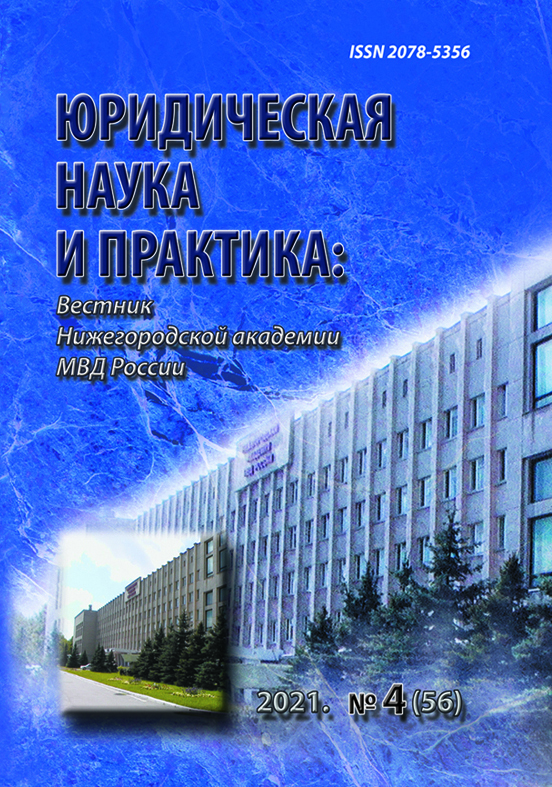The article discusses the main approaches to the problem of legal protection of constitutional rights of citizens in Russian and foreign legal doctrine. Given the complexity and scope of this topic, the main attention is paid to such aspects as the protection of constitutional rights of citizens in the context of globalization and the protection of constitutional rights of citizens in the context of digitalization. It is argued that the processes of globalization and digitalization have posed a number of urgent issues to scientists, and the scientific community should be ready to resolve them. Based on the analysis, it is concluded that the processes of globalization and digitalization entail the weakening of national legal institutions, which is a serious threat to the constitutional rights of citizens.
constitutional rights of citizens, legal doctrine, theory of state and law, constitutional law, comparative jurisprudence, globalization, digitalization
1. Minnikes I. A., Parfenova T. A. The foreign legal doctrine of the global con-stitution (questions of theory). Academic Law Journal, 2020, no. 4 (82), pp. 18-23. (In Russ.)
2. Robots claim their rights: doctrinal legal framework and ethical standards of using Autonomous robotic technology and devices: collective monograph / ed. by A. Yu. Mamytcheva, A. Y. Mordovtseva, G. V. Petruk. Moskow: RIOR Publ., 2020. 349 p. (In Russ.)
3. Transformation of law in the digital age: a collective monograph / ed. by A. A. Vasiliev. Barnaul: Altai University Publ., 2020. 432 p. (In Russ.)
4. Walker N. Intimations of global law. Cambridge: Cambridge university press Publ., 2015. 212 p.
5. Rainer A. L’Etat de droit comme fondament du constitutionnalisme Euro-peen. Revue française de droit constitutionnel: Numéro special, Paris, 2014. Décembre, no. 100, pp. 769-776.
6. Garcia F. J. Globalization’s law: Transnational, global or both? Forthcom-ing in the global community: Yearbook of international law & jurispru-dence 2015, Oxford: Oxford university press Publ., 2016, vol. 1, no. 1.
7. Bringas A. M. De. Derecho, soberania y pluralismo constitucional en el contexto de la globalizacién. Un an élisis de sus tensiones y complejidades. CEFD (Cuadernos Electrénicos de Filosofia del derecho), Valéncia, 2017, no. 36, pp. 127-148.
8. Vergottini G. De. La persistente soberan ía. UNED. Teoría y realidad con-stitucional, Madrid, 2015, no. 36, pp. 67-91.
9. Kumm M., Havercroft J., Dunoff J., Wiener A. The end of "The west" and the future of global constitutionalism. Global constitutionalism, Cambridge, 2017, vol. 6, no. 1, pp. 1-11.
10. Pozas Loyo A. What is "constitutional efficacy"? Conceptual obsta-cles for research on the effects of constitutions. Mexican law review, Mexi-co, 2016, vol. 9, no. 1, pp. 24-44.
11. Polyakova T. A., Minbaleev A. V., Krotkova N. V. Formation of the information law system as a scientific direction: stages of development and prospects. State and law, 2019, no. 2, pp. 80-92. (In Russ.)
12. Umnova-Konyukhova I. A., Aleshkova I. A. Human rights and ethics in the conditions of information digital technologies and bioengineering. State and Law, 2021, no. 9, pp. 75-89. (In Russ.)
13. Solove D. The myth of the privacy paradox. The George Washington law review. Washington, 2021, vol. 89, no. 1, pp. 1-51.
14. Bellovin St., Dutta K., Reitinger N. Privacy and Synthetic Datasets. Stanford technology law review, Stanford, 2019, vol. 22, no. 2, pp. 1-52.
15. Galindo F., Marco J. G. Freedom and the Internet: Empowering citi-zens and addressing the transparency gap in search engines. European journal of law and technology, Belfast, 2017, vol. 8, no. 2, pp. 1-18.
16. Bohm A. S., George E. J., Cyphers B., Lu S. Privacy and liberty in an alaways-on, always-listening world review. The Columbia science and technology law, New York, 2017, vol. 19, no. 1, pp. 1-45.
17. Boshe P. Data privacy law: An international perspective. Information and communications technology law, London, 2015, vol. 24, no. 1, pp. 118-120.
18. Scott J. D. Social media and government surveillance: The case for be er privacy protections for our newest public space. Journal of business and technology law, Baltimore, 2017, vol. 12, no. 2, pp. 151-164.
19. Ranchordas S., Goanta C. The new city regulators: Platform and public values in smart and sharing cities. Computer law and security re-view, 2020, vol. 36.
20. O’Regan C. Hate speech online: an (intractable) contemporary chal-lenge? Current legal problems, Oxford, 2018, vol. 71, no. 1, pp. 403-429.












